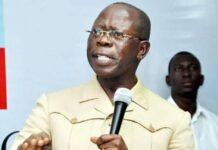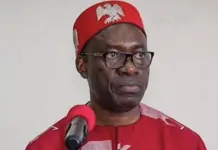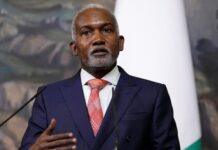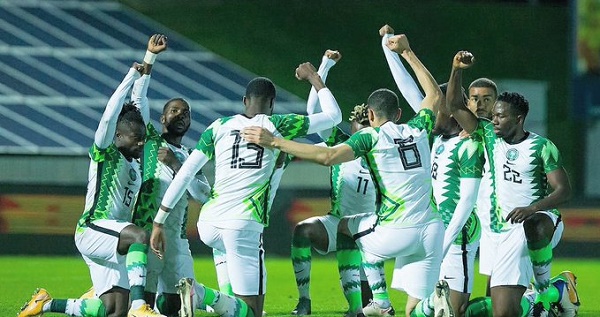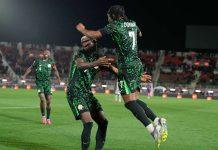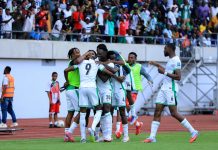In the European game, I support Liverpool FC of England. When the Reds’ African legion scores goals with aplomb, I can’t help but think of Nigerians working in Europe. My mind immediately went to the annual Africa Footballer of the Year award, knowing that a Nigerian player had not won the award in a long time. With the passage of time, the possibility of a Nigerian winning the award appears to be more of a mirage than a reality. Certainly not due to a lack of quality players.
The three Africans on Liverpool’s payroll, Mohammed Salah (Egyptian), Sadio Mane (Senegalese), and Naby Keita (Guinean), dominated the weekend for the Reds. In one of the Premier League games played last week in England, the trio scored in the Reds’ 3-0 demolition of Crystal Palace at Anfield. Mane scored his 100th goal in England, for the record. But the Senegalese’s biggest achievement on Saturday was scoring against Crystal Palace for the ninth time since he began playing against them.
Mane is the 18th Liverpool player to score 100 goals in all competitions. Many would say it’s incredible, but not because another African in Liverpool, Mohamed Salah, is breaking goals records like they’re going out of style. The Egyptian has four goals in the five-week-old league, keeping him in contention with serial goal-scorer Cristiano Ronaldo, who has three goals. According to the statistics, the race for Africa Footballer of the Year this year will be a straight fight between Mane and Salah. It is worth noting, however, that another African, Riyad Mahrez, who plays for the reigning Premier League champion, could finish the season ahead of the Liverpool duo, but such an upset appears unlikely.
The common thread running through the trio’s playing credentials is their consistency for their clubs and countries over the last five years, with all three serving as captains of their respective national teams. Any Nigerian playing in Europe would have to perform a miracle to beat them. The trio play for teams in the UEFA Champions League, which is another platform where they can earn more points by scoring goals, unlike any Nigerian, who, forgive my arrogance, plays in the lower European tournaments.
Salah, Mane, and the rest of the Nigerian squad are capable of giving Salah, Mane, and the rest of the team a run for their money. They are, however, rising stars who will take time to mature. Victor Osimhen, Kelechi Iheanacho, Samuel Chuwueze, Wilfred Ndidi, Paul Onuachu, Kingsley Michael, Joe Aribo, Taiwo Awoniyi, Kelechi Nwakali, and others are among the contenders for the award that Nigerians dominated in the past. The majority of them are Golden Eaglets, or young people who have come from the country’s Golden Eaglets. However, winning the award requires more than just playing in European leagues. Previous award winners have been distinguished by their personal commitment to the game, discipline, and exemplary character, as well as those who were finalists but did not win.
Will we continue to be awestruck as these threesomes share the Africa Footballer of the Year award? This writer would have mockingly stated that there is no hope for any Nigerian. But I’m forced to reconsider this broad assumption after seeing what another Nigerian, Victor Osimhen, is doing for Napoli FC, the Italian club made famous by the late Diego Armando Maradona. Last week, Osimhen scored a brace that broke the hearts of Leicester FC fans, who watched in disbelief as the Nigerian erased the Foxes’ two-goal advantage in one of the Europa Cup matches.
Osimhen’s rise to prominence in international football is no fluke. FIFA’s deliberate policy of catching footballers young with its novel age-grade competitions is an attestation to his rise to stardom in the elite class. Osimhen was the Golden Eaglets’ top scorer, with pundits predicting that if he improves on his sublime skills and knack for scoring goals, he will paint Europe red with goals.
Even though he had the talent, few expected Osimhen to be the Super Eagles’ top performer. Indeed, his moves between clubs didn’t help matters, but he was fortunate to find his stride while playing for Lille FC in France. After weekly outstanding achievements, winning several Man of the Match awards, and gaining the confidence and respect of his coaches, teammates, and fans, it didn’t take long for him to receive rave reviews.
Osimhen became the heart and soul of his French team, attracting the attention of Nigerian coach Gernot Rohr. He had a successful career with the Belgian national team, culminating in his famous move to Naples to play for Napoli. Rohr’s decision to leave another former Golden Eaglet Kelechi Iheanacho out of the Eagles’ squad for the last Africa Cup of Nations wasn’t well received, with critics claiming that the manager should have looked at Leicester City FC’s pedigree in the game, despite agreeing that Iheanacho had lost form. Given how competitive the Barclays English Premier League is among other European leagues, Iheanacho’s experience towered over what Osimhen was doing for Lille in the French Ligue 1.
Kelechi Iheanacho, who scored six goals and added seven assists at the 2013 U-17 World Cup in Abu Dhabi, was named MVP. In the UAE, he was named MVP and second leading scorer with six goals, trailing only Swede Valmir Berisha’s seven goals. In 27 appearances for the Super Eagles, he has scored nine goals.
Samuel Chukwueze won the Bronze Ball in Chile 2015 after overcoming the setback of his family torching his boots and training gear in an attempt to discourage him from continuing in the sport.
With these promising Nigerian players’ futures bright, it’s only a matter of time before Nigeria reclaims her former dominance in the race for Africa’s best football player. Nigeria’s problem is that there are no strong structures in place across the country to discover, nurture, and expose new talent. One of the nagging issues that arises as a result of this is that young talents soon feel too big for the system and start running their own shows. They quickly lose steam, and Nigeria suffers as a result – examples abound.
The NFF chiefs are sincere in ensuring that only those of the right ages make the Golden Eaglets team – the factory that has produced several kids, many of whom did well, but others who melted away like ice cream under the scorching sun.
Sports are developed in civilized countries through a neighborhood system in which facilities are built to engage youth and keep them away from social vices. Nurseries are used to store the data of those who have been discovered. Such information aids in the development and monitoring of the stars. Furthermore, nurseries lay the groundwork for athletes to learn the fundamentals of the game. Playing styles and patterns that are unique to each country are developed in such factories.
Without the government’s help, sports cannot thrive in Nigeria. It is the responsibility of the government to provide facilities and create an enabling environment for the industry to function with corporate support. If the government’s commitment to sports is known, blue-chip companies will be willing to support the industry. Sports-friendly businesses should be rewarded by the government.
Once the government has persuaded the corporate world to invest in sports programs, the federation should make sure that their foreign coaches are included in the process, so that they are forced to look to the products of such efforts to replace our aging stars, rather than scouring Europe for kids who have never visited this country to play for us.
Join Television Nigerian Whatsapp Now
Join Television Nigerian Facebook Now
Join Television Nigerian Twitter Now
Join Television Nigerian YouTUbe Now

